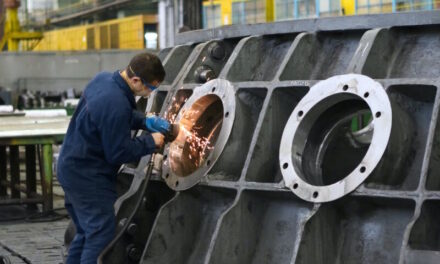Following a ‘perfect storm’ in the energy sector that has led to an unprecedented spike in energy prices, experts at commercial energy broker and utilities consultancy Advantage Utilities are urging factories and warehouses to review their long-term commercial energy strategy to ensure they survive the turbulent months ahead.
An abnormally cold winter in Asia earlier this year re-routed LNG shipments from Europe to Asia, resulting in less tankers arriving in the UK. This led to the UK depleting its gas storage to get through the winter. Low winds in Northern Europe causing decreased outputs from renewables coupled with disruptions to LNG output in the US due to the hurricane season hasn’t helped matters either and in a further blow, September saw an interconnector fire knock out around 7% of the UK’s energy supply. National Grid said the blaze – which happened at a converter station in Kent – will reduce capacity by about 50% until March 2022.
In what has been described as a ‘perfect storm’ of events, the unprecedented surge in energy prices has led to many energy firms going bust and thousands of businesses across the UK being affected. The alarming impact on energy pricing was revealed in a recent report by commercial energy broker and utilities consultancy Advantage Utilities which reported that the average annual contract price back in October 2020 was £42/MWh, while the market price for an October 2021 annual contract was an eye watering £158/MWh.
Commenting on the report’s findings, Andy Grover, Chief Executive Officer at Advantage Utilities said, “Gas usage amongst the heavy industries has fallen due to gas price exposure, with operations such as gas fertiliser production no longer cost effective at these prices. The loss of CO2 supply, a by-product of the fertiliser industry, will have a knock-on effect on other industries, particularly the food and drink sector where the gas is used for packaging and carbonation. If this feeds down through the economic supply chain, we may start to see further demand reduction as wider industries are forced to turn down.”
In the face of such uncertainty and price volatility, Andy is keen to reiterate the importance of forward planning for businesses of all sizes. “Rather than looking for immediate stop-gap solutions, it will be a long-term focus that mediates the energy costs and secures business survival, especially if contract end dates are looming. Try to think about a three or five year period ahead rather than one season,” he explains.
Whilst it can be tempting to hold out on a renewal when the market is high, like it is now, Andy advises that it is always preferable to have a contract in place. “An option for the future is flexible purchasing that allows you to purchase based on a risk management strategy. Suppliers are currently updating pricing on contract offers more frequently than usual, meaning the timeframe for businesses to accept offers is tighter. Signatories need to be made available for acceptance as soon as possible once contracts are received and don’t leave it to the last minute or you will end up with limited options.”
With both the commodity and the non-commodity elements of the bill rising, Andy reiterates there has never been a more important time to double-down on energy efficiency. “Businesses need to find ways to offset these increases to their energy bills and to futureproof their organisation by combating wastage, reducing consumption and ensuring supply. Consuming during non-peak times, shifting the load, or considering investing in on-site generation, such as solar panels and heat pumps, are all ways in which businesses could take a more proactive approach to try and mitigate rising prices.”
For those organisations that have flexibility, have back-up power sources, or can load-shift, the situation is more positive. Andy says these businesses have an opportunity to sell their excess energy at premium rates and create a solid income from flexing their energy. A simple desktop audit is a good place to start, as businesses may be able to identify measures and products that could help them reduce consumption and costs during these volatile times.
“There is no denying it is a concerning time to be a business owner, however by implementing some of the steps above, businesses can begin to minimise some of the impact of rising prices. This could also prove an important opportunity to look into the sustainability of the business, where energy is coming from and how they are complying with growing sustainability regulations. This desktop audit should feature the overall impact of the business upon their environment, too” advises Andy.



